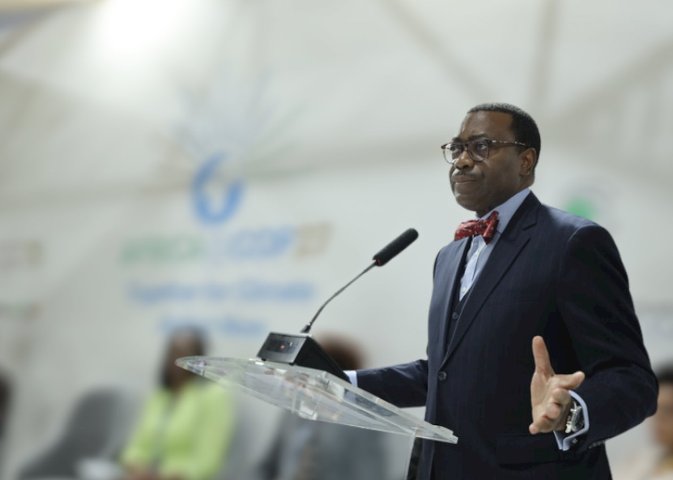Adesina Calls for African Economic Self-Reliance at Global Trade Conference
Kabera welcomed the conference as a timely opportunity for knowledge exchange and policy dialogue to help Africa respond to its overlapping development challenges with greater resilience.

- Country:
- Rwanda
As the world grapples with climate shocks, geopolitical tensions, and growing trade disruptions, African Development Bank (AfDB) President Dr. Akinwumi Adesina has issued a rallying call for African nations to take greater control of their economic destinies. Speaking at the 28th Annual Conference on Global Economic Analysis in Kigali, Rwanda, Adesina challenged African countries to reduce dependence on aid and chart a future based on investment, value addition, and strategic trade.
Hosted from 25 to 27 June 2025, the high-level conference brought together thousands of researchers, economists, and global policy experts. It was co-organized by the United Nations Economic Commission for Africa (UNECA) and Purdue University’s Global Economic Analysis Project (GTAP), with the aim of advancing evidence-based policy dialogue to tackle the world's most pressing development challenges.
End of the Aid Era: Time for Investment-Driven Development
In a keynote address that resonated deeply across policy circles, Adesina declared,
“Africa must chart its future, relying not on the benevolence of others, but on its own determination. The era of aid or free money is gone. African countries must now learn to develop via the discipline of investments.”
With donor fatigue and shrinking foreign aid becoming more evident, especially in the wake of global crises such as the COVID-19 pandemic and the war in Ukraine, Adesina emphasized that aid dependency is no longer sustainable. Instead, Africa must pursue long-term investment strategies, rooted in value addition, infrastructure development, and regional trade integration.
He underscored that the export of raw commodities, such as cocoa, gold, or crude oil, traps African economies in low-income status. In contrast, the path to prosperity lies in processing and manufacturing these resources locally, thereby creating jobs, increasing tax revenues, and spurring industrial growth.
Tariffs, Inflation, and Trade Fragmentation
Adesina also warned of the adverse effects of rising protectionist policies, particularly the recent tariffs introduced by the United States, which he said could exacerbate inflationary pressures across Africa, reduce export revenues, and weaken already fragile local currencies. These external shocks, combined with a volatile geopolitical landscape, are putting unprecedented stress on African economies.
Echoing this sentiment, Rwanda’s National Treasury Minister Godfrey Kabera said,
“Economies are being tested, from volatile commodity prices driven by geopolitical conflicts to the disruption of global trade routes.”
Kabera welcomed the conference as a timely opportunity for knowledge exchange and policy dialogue to help Africa respond to its overlapping development challenges with greater resilience.
AfCFTA: A $3.4 Trillion Opportunity
A key part of Adesina’s vision for African economic transformation is the full implementation of the African Continental Free Trade Area (AfCFTA). While Africa accounts for 17% of the world’s population, its share of global trade remains stagnant at just 2.5%.
Adesina urged policymakers and private sector leaders to leverage AfCFTA’s $3.4 trillion market potential, which he said could:
-
Increase intra-African trade by 50%
-
Lift 50 million people out of poverty
-
Create 14 million new jobs across the continent
He called for people-centered policies to accelerate regional integration and ensure trade serves broader social and developmental goals, such as job creation, food security, and sustainable industrialization.
Africa’s Creditworthiness and the African Credit Risk Agency
Adesina also celebrated the upcoming launch of the African Credit Risk Agency (ACRA)—a continental initiative he has championed to address the biases of international credit rating agencies. These agencies, Adesina argued, often assign unfairly high-risk premiums to African countries, raising the cost of borrowing and stifling access to global capital markets.
Citing Moody’s Analytics, he noted that Africa’s default risk on infrastructure projects is the lowest globally, at 1.9%, compared to 12% in more developed regions.
“The African Credit Risk Agency will correct false narratives and provide a credible, home-grown mechanism to evaluate African investment risk on fair terms,” he emphasized.
The Role of Collaboration in Economic Policy
Stephen Karingi, UNECA’s Director for Regional Integration and Trade, called for deeper partnerships between policymakers, researchers, and data scientists to support decision-making with high-quality evidence.
“As we explore the global dynamics of trade, climate, and development, let us remember the power of collaboration,” Karingi said, urging the academic and policy community to work hand-in-hand to drive Africa’s transformation.
The Power of Evidence: GTAP’s Global Mission
The conference also highlighted the work of the Global Trade Analysis Project (GTAP), founded in 1992 and now comprising over 32,000 global researchers. GTAP supports data-driven analysis of complex trade, environmental, and economic dynamics, enabling governments and development partners to craft smarter, more effective policies.
By hosting the GTAP conference in Africa, stakeholders hoped to increase regional ownership of trade and development strategies, embed locally relevant research, and foster next-generation African economic leadership.
A New Vision for Africa
Adesina’s keynote in Kigali may well mark a turning point in the continent’s development discourse—one that emphasizes self-reliance, strategic partnerships, and intelligent capital allocation. His message was clear: the era of handouts is ending, but the age of homegrown prosperity, driven by African talent, trade, and transformation, is just beginning.










